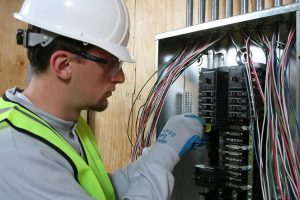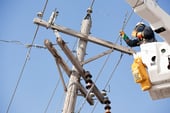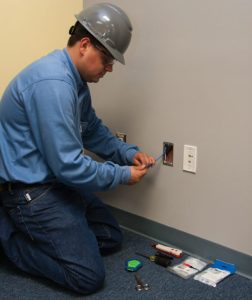Every time a family switches on their lights, a business powers up its operations, or a new innovation brings energy efficiency to life, it’s thanks to skilled professionals in the electrical trades. These are the people who bring power and connection to homes, businesses, and entire communities—transforming lives every day.
The electrical trades aren’t just jobs; they’re careers with purpose. As an electrical worker (often known as an electrician), you’ll be part of building the systems that drive progress and create a brighter future. Whether you are installing the wiring for a cutting-edge tech hub, maintaining the power grid that keeps cities alive, or integrating energy-efficient systems in a sustainable home, your work will make an impact that matters.
What Do Electrical Workers Do?
Electrical workers design, install, maintain, and repair the electrical systems that power our world. Whether it’s wiring a new home, troubleshooting a factory’s energy system, or upgrading a city’s power infrastructure, these roles are diverse and dynamic. Professionals in the electrical trades can specialize in several key areas:
Wiremen

Wiremen are the experts who bring power from the point of entry in a building to the systems and equipment inside. Wiremen are often who we think of when we say “electricians.” They are responsible for ensuring that homes, offices, and factories have reliable power for lights, appliances, and advanced systems like fire alarms, security, and energy management.
Typical tasks of a Wireman include:
- Installing electrical wiring and circuit breakers
- Connecting low-voltage systems like computer networks and security alarms
- Testing and troubleshooting electrical systems to ensure safety and efficiency
- Integrating renewable energy systems like solar panels
With technology evolving, Wiremen are increasingly working on complex projects like smart homes and energy-efficient buildings. Their skills are in high demand across residential, commercial, and industrial sectors.
Lineworkers

Lineworkers, who are often called “Linemen,” ensure that electricity flows smoothly from power plants to homes, businesses, and beyond. These professionals work on power transmission and distribution systems, often outdoors and sometimes in challenging conditions.
Key responsibilities of a Lineworker include:
- Installing and maintaining transformers and power lines
- Repairing power systems after storms or outages
- Setting up and maintaining power poles and substations
- Ensuring electrical systems comply with OSHA and safety regulations
Linemen are crucial to the backbone of the electrical grid. Their work keeps the lights on, the heat running, and the world moving forward.
Installer Technicians

Installer Technicians focus on low-voltage systems, such as the cabling used for video, voice, data, and security systems. They work behind the scenes in office buildings, manufacturing spaces, and other facilities to create networks that keep people and businesses connected.
Core duties of an Installer Technician include:
- Installing, terminating, and testing copper and fiber-optic cables
- Setting up security, communication, and sound systems
- Configuring and maintaining network equipment like routers and telephone systems
- Troubleshooting and repairing advanced communication networks
As more businesses and homes rely on interconnected systems, the demand for skilled Installer Technicians continues to grow.
Why Choose the Electrical Trades?
The electrical trades offer more than just a paycheck—they provide opportunities for growth, stability, and meaningful work. As an electrical worker, you’ll enjoy:
- High Demand: Electrical work is essential, with job growth far exceeding many other industries.
- Competitive Pay: After completing an apprenticeship, professionals in the electrical trades can earn between $25 and $42 per hour or more, depending on certifications and experience.
- Innovation: Be at the forefront of emerging technologies like renewable energy, smart systems, and advanced communication networks.
- A Sense of Pride: You’ll build systems that power homes, hospitals, schools, and businesses—helping to improve lives every day.
How Do You Get Started in the Electrical Trades?
Becoming an electrical worker begins with a registered apprenticeship program, where you’ll gain hands-on experience and classroom education. Most programs are not only low-cost for students but allow you to earn while you learn, making this an affordable and accessible career path.
Explore apprenticeship opportunities on our Apprenticeship page or visit the Get Started page to take the first step toward a fulfilling career in the electrical trades!
Take the Next Step
The electrical trades are more than a career—they’re a way to make a difference. By choosing this path, you’re not just powering buildings; you’re powering lives and building a future filled with opportunity and innovation.
Ready to learn more? Start your journey today and see how a career in the electrical trades can transform your future!
